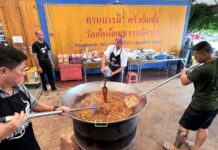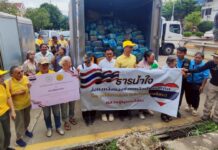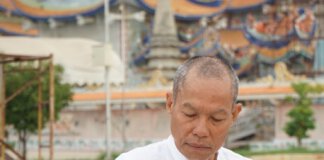พระโพธิสัตว์เกิดเป็นม้า
๒๕ กุมภาพันธ์ ๒๕๖๘
โภชาชานียชาดก
พระศาสดา เมื่อประทับอยู่ในพระวิหารเชตวัน ทรงปรารภภิกษุผู้ละความเพียรรูปหนึ่ง จึงตรัสพระธรรมเทศนานี้ มีคำเริ่มต้นว่า อปิ ปสฺเสน เสมาโน ดังนี้.
สมัยนั้น พระศาสดาตรัสเรียกภิกษุนั้นมา แล้วตรัสว่า ดูก่อนภิกษุ บัณฑิตทั้งหลาย แม้ในกาลก่อน ได้กระทำความเพียร แม้ในที่อันมิใช่ที่อยู่ แม้ได้รับบาดเจ็บ ก็ไม่ละความเพียร ดังนี้แล้ว ทรงนำอดีตนิทานมาว่า
ในอดีตกาล เมื่อพระเจ้าพรหมทัตครองราชสมบัติ อยู่ในนครพาราณสี พระโพธิสัตว์บังเกิดในตระกูลม้าสินธพชื่อ โภชาชานียะ สมบูรณ์ด้วยอาการทั้งปวง ได้เป็นม้ามงคลของพระเจ้าพาราณสี.
พระโพธิสัตว์นั้นบริโภคโภชนะ ข้าวสาลีมีกลิ่นหอมอันเก็บไว้ ๓ ปี ถึงพร้อมด้วยรสเลิศต่างๆ ในถาดทองอันมีราคาแสนหนึ่ง ยืนอยู่ในภาคพื้นอันไล้ทาด้วยของหอมมีกำเนิด ๔ ประการเท่านั้น สถานที่ยืนนั้น วงด้วยม่านผ้ากัมพลแดง เบื้องบนดาดเพดานผ้าอันวิจิตรด้วยดาวทอง ห้อยพวงของหอมและพวงดอกไม้ ตามประทีปนํ้าหอม.
ก็ขึ้นชื่อว่า พระราชาทั้งหลายผู้ไม่ปรารถนาราชสมบัติในนครพาราณสี ย่อมไม่มี คราวหนึ่ง พระราชา ๗ พระองค์พากันล้อมนครพาราณสี ทรงส่งหนังสือแก่พระเจ้าพาราณสีว่า จะให้ราชสมบัติแก่เราทั้งหลายหรือจะรบ.
พระเจ้าพาราณสีให้ประชุมอำมาตย์ทั้งหลาย แล้วตรัสบอกข่าวนั้น แล้วตรัสถามว่า ดูก่อนพ่อทั้งหลาย บัดนี้ พวกเราจะกระทำอย่างไร? พระราชาทั้ง ๗ พระนคร ต่างยกไพร่พลทหารมาล้อมเมือง เพื่อบีบบังคับให้เรายกราชสมบัติให้ หาไม่แล้วก็จะจู่โจมรบพุ่ง
อำมาตย์ทั้งหลายกราบทูลว่า ข้าแต่สมมติเทพ เบื้องต้นพระองค์ยังไม่ต้องออกรบก่อน พระองค์จงส่งทหารม้าชื่อโน้นให้กระทำการรบ เมื่อทหารม้านั้นไม่สามารถ ข้าพระบาททั้งหลายจักรู้ในภายหลัง.
พระราชารับสั่งให้เรียกทหารม้านั้นมา แล้วตรัสว่า ดูก่อนพ่อ เธอจักอาจกระทำ การรบกับพระราชา ๗ องค์หรือไม่.
นายทหารม้ากราบทูลว่า ข้าแต่สมมติเทพ ถ้าข้าพระบาทได้ม้าสินธพ ชื่อโภชาชานียะไซร้ พระราชา ๗ พระองค์จงยกไว้ ข้าพระบาทจักอาจรบกับพระราชาทั่วทั้งชมพูทวีปเลยก็ได้พระเจ้าข้า
พระราชาตรัสว่า ดูก่อนพ่อ ม้าสินธพโภชาชานียะ หรือม้าอื่นก็ช่างเถิด.
นายทหารม้านั้นรับพระดำรัสแล้ว ถวายบังคมพระราชาลงจากปราสาท ให้นำม้าสินธพโภชาชานียะมา แม้ตนก็ผูกสอดเกราะทุกอย่าง เหน็บพระขรรค์ ขึ้นหลังม้าสินธพตัวประเสริฐ ออกจากพระนครไปประดุจฟ้าแลบ ทำลายกองพลที่ ๑ จับเป็นพระราชาได้องค์หนึ่ง พามามอบให้แก่พลในนครแล้วกลับไปอีก ทำลายกองพลที่ ๒ กองพลที่ ๓ ก็เหมือนกัน จับเป็นพระราชาได้ ๕ องค์อย่างนี้ ด้วยประการฉะนี้ แล้วทำลายกองพลที่ ๖
ในคราวจับพระราชาองค์ที่ ๖ ม้าสินธพโภชาชานียะได้รับบาดเจ็บ เลือดไหล เวทนากล้าเป็นไป นายทหารม้านั้นรู้ว่า ม้าสินธพนั้นได้รับบาดเจ็บ จึงให้ม้าสินธพโภชาชานียะนอนที่ประตูพระราชวัง เริ่มทำเกราะให้หลวม เพื่อจะผูกเกราะม้าตัวอื่น พระโพธิสัตว์ ทั้งที่นอนทางข้างที่มีความผาสุกมาก ลืมตาขึ้นเห็นนายทหารม้า (ทำอย่างนั้น) จึงคิดว่า นายทหารม้านี้จะหุ้มเกราะม้าตัวอื่น และม้าตัวนี้จักไม่สามารถทำลายกองพลที่ ๗ จับพระราชาองค์ที่ ๗ ได้ และกรรมที่เราทำไว้แล้ว จักพินาศหมด แม้นายทหารม้าซึ่งไม่มีผู้เปรียบก็จักพินาศ แม้พระราชาก็จักตกอยู่ในเงื้อมมือของพระราชาของเมืองอื่น เว้นเราเสีย ม้าตัวอื่นชื่อว่า สามารถเพื่อทำลายกองพลที่ ๗ แล้ว จับพระราชาองค์ที่ ๗ ได้ย่อมไม่มี ทั้งๆ ที่นอนอยู่นั่นแล ให้เรียกนายทหารม้ามา แล้วกล่าวว่า ดูก่อนนายทหารม้าผู้สหาย เว้นเราเสีย ชื่อว่า ม้าอื่นผู้สามารถเพื่อทำลายกองพลที่ ๗ แล้วจับพระราชาองค์ที่ ๗ ได้ย่อมไม่มี เราจักไม่ทำกรรมที่เรากระทำแล้วให้เสียหาย ท่านจงให้เราแลลุกขึ้นแล้วผูกเกราะเถิด
ครั้นกล่าวแล้ว จึงกล่าวคาถานี้ว่า
ม้าสินธพอาชาไนยถูกลูกศรแทงแล้ว แม้นอนตะแคงอยู่ข้างเดียว ก็ยังประเสริฐกว่าม้ากระจอก ดูก่อนนายสารถี ท่านจงประกอบฉันออกรบเถิด.
นายทหารม้าพยุง พระโพธิสัตว์ให้ลุกขึ้น พันแผลแล้ว ผูกสอดเรียบร้อย นั่งบนหลังของพระโพธิสัตว์นั้น ทำลายกองพลทับที่ ๗ จับเป็นพระราชาองค์ที่ ๗ แล้วมอบให้แก่พลของพระราชา คนทั้งหลายนำ แม้พระโพธิสัตว์มายังประตูพระราชวัง พระราชาเสด็จออก เพื่อทอดพระเนตรพระโพธิสัตว์นั้น.
พระมหาสัตว์ทูลพระราชาว่า ข้าแต่มหาราช พระองค์อย่าทรงฆ่าพระราชาทั้ง ๗ เลย จงให้กระทำสัจจะสาบานแล้วปล่อยไป พระองค์จงประทานยศที่จะพึงประทานแก่ข้าพระบาทและนายทหารม้า ให้เฉพาะแก่นายทหารม้าเท่านั้น การจับพระราชา ๗ องค์ได้แล้ว ทำทหารผู้กระทำการรบให้พินาศ ย่อมไม่ควร แม้พระองค์ก็จงทรงบำเพ็ญทาน รักษาศีล ทรงครองราชสมบัติโดยธรรม
เมื่อพระโพธิสัตว์ให้โอวาทแก่พระราชาอย่างนี้แล้ว คนทั้งหลายจึงถอดเกราะของพระโพธิสัตว์ออก เมื่อเกราะถูกถอดออกเท่านั้น พระโพธิสัตว์มีอันสิ้นชีวิตไปในทันที.
พระราชาทรงให้ทำฌาปนกิจสรีระของพระโพธิสัตว์นั้นแล้วได้ทรงประทานยศใหญ่แก่นายทหารม้า ทรงให้พระราชาทั้ง ๗ พระองค์ ทรงกระทำสัจจะสาบานที่จะไม่ประทุษร้ายพระองค์และพระนครพาราณสีนี้อีก แล้วทรงส่งให้กลับคืนสู่พระนครของตน พระราชาพาราณสีและราชาทั้ง ๗ พระนคร ทรงครองราชสมบัติโดยธรรมโดยสมํ่าเสมอตราบจนสิ้นพระชนมายุ ได้เสด็จไปตามผลแห่งกรรมที่ทรงได้กระทำไว้
พระศาสดาตรัสว่า ดูก่อนภิกษุทั้งหลาย บัณฑิตทั้งหลายในปางก่อนได้กระทำความเพียร แม้ในที่อันมิใช่บ่อเกิดอย่างนี้ แม้ได้รับบาดเจ็บเห็นปานนี้ก็ไม่ละความเพียร ส่วนเธอบวชในศาสนาอันเป็นเครื่องนำออกจากทุกข์เห็นปานนี้ เพราะเหตุไรจึงละความเพียรเสีย แล้วทรงประกาศสัจจะทั้ง ๔
ในเวลาจบสัจจะ ภิกษุผู้ละความเพียรตั้งอยู่ในพระอรหัตผล.
ฝ่ายพระศาสดา ครั้นทรงนำพระธรรมเทศนานี้มาสืบต่ออนุสนธิแล้ว จึงทรงประชุมชาดกว่า
พระราชาในครั้งนั้น ได้เป็น พระอานนท์
นายทหารม้าในครั้งนั้น ได้เป็น พระสารีบุตร
ส่วนโภชาชานียสินธพในครั้งนั้น ได้เป็น เรา แล.
พุทธะอิสระ
——————————————–
อ่านย้อนหลัง : https://www.facebook.com/buddha.isara/posts/pfbid02tWxdVWEgKsjaVBMG3XzhxBiCysHWnpMmz6K7wnUeqyNRN5wvwr32Xg68GRHTLnFUl
——————————————–
The Bodhisatta was born as a horse.
February 25, 2025
Bhojajaniya Jataka
While staying at the Jetavana Monastery, the Buddha preached this sermon, referring to a monk who had given up persevering, beginning with the words “Api passena semaano.”
At that time, the Buddha called that monk and said, “Monks, in the past, the wise and good persevered. Even when they were injured, they did not give in.” Then, the Buddha told this story of the past:
When King Brahmadatta reigned in Benares City, the Bodhisatta was born as a Sindh horse named Bhojajaniya. Perfect in all aspects, it became the auspicious horse of the king.
The Bodhisatta was fed on exquisite, fragrant, three-year-old rice, served in a golden tray worth a hundred thousand coins. Its stall was perfumed with the four odors and decorated with crimson curtains, while overhead was a canopy studded with stars of gold, festooned wreaths and garlands of flowers, and scented lamps.
All the kings coveted the kingdom of Benares. Once seven kings encompassed the city, and sent a missive to King Brahmadatta, “Either yield up your kingdom to us or face war.”
Assembling his ministers, the King asked, “What should we do now? The kings of the seven cities and their soldiers have surrounded our city to force us to give them the kingdom or else they will attack and fight.”
The ministers said, “My lord, you do not have to fight in the first instance. Send that cavalry to fight. If the cavalry fails, we will decide what to do.”
The king sent for the cavalry and asked them, “My friends, can you fight with the seven kings?”
The cavalry officer said, “Your Majesty. If I got the Sindh horse named Bhojajaniya, I could even fight with kings of the whole Indian continent.
The king said, “My dear knight, take my warhorse or any other horse you please, and do battle.”
The cavalry officer received the royal command, paid homage to the king, and descended from the palace. Then, he had the noble destrier led out. He armed himself from head to toe and girded on his sword. He mounted the excellent Sindh horse and left the city like lightning. He broke down the first camp and captured a king as a prisoner. Returning to the field, he destroyed the second and third camps, and so on until he captured five kings alive. Then, he destroyed the sixth division.
While the sixth king was captured, the Sindhu horse Bhojajaniya got injured, bled, and suffered greatly. Knowing that the horse was injured, he had the horse lie down at the palace gate. Then, he loosened the armor on the Bhojajaniya horse and intended to put the armor on another horse. While lying on the side comfortably, the Bodhisatta horse opened its eyes and saw the cavalry officer doing so. It thought, “This cavalry officer will armor another horse, and this horse will not be able to destroy the seventh division and capture the seventh. What I have done would be wasted.
Even the incomparably competent cavalry officer will be killed. Even the king will fall into the hands of the kings of other cities. No other horse except me can destroy the seventh division and capture the seventh king.
While lying there, it called the cavalry officer and said, “Friend cavalry officer, no other horse can destroy the seventh division and capture the seventh king. I will not let my accomplishments be wasted. Let me get up and tie the armor.” Having said this, it recited this verse:
“The Sindh horse, pierced by an arrow, even if it lies on its side, is still better than a meager horse.”
“Oh charioteer, you should prepare me for battle.”
The cavalry officer helped the Bodhisatta stand up, bandaged its wounds to stop the bleeding, and sat on its back. He destroyed the seventh army, captured the seventh king, and handed him over to the king’s soldiers. People brought the Bodhisatta horse to the palace gate. The king came out to see the Bodhisatta.
The Great Being told the king, “Oh, great king, do not kill the seven kings. Make them swear an oath and release them. Let the calvary officer enjoy all the honor due to us both, for it is not right that a warrior who has presented you with seven captive kings should be brought low. You should also practice charity, observe the precepts, and rule your kingdom in righteousness and justice.”
When the Bodhisatta had thus advised the king, the people removed the Bodhisatta’s armor. As soon as the armor was removed, the Bodhisatta died immediately.
The king had the Bodhisatta’s body burnt with all respect and granted great honor to the cavalry officer. The king sent the seven kings to their cities after exacting from each an oath never to war against him anymore.
The King of Benares and the kings of the seven cities ruled righteously and consistently until their deaths and were reborn according to their meritorious actions.
The Buddha said: “Monks, the wise and good persevered amid hostile surroundings and even when wounded so grievously, still did not give in. You have ordained in a religion that is a way out of suffering, why did you abandon your effort?” Then, the Buddha announced the Four Noble Truths.
In the end, the faint-hearted monk won Arahatship.
The Buddha, having continued this sermon, then concluded the birth story:
The king at that time has become Ananda.
The cavalry officer at that time has become Sariputta.
And the Bhojajaniya Sindh horse at that time has become me.
Buddha Isara
——————————————–
Previous article : https://www.facebook.com/buddha.isara/posts/pfbid02tWxdVWEgKsjaVBMG3XzhxBiCysHWnpMmz6K7wnUeqyNRN5wvwr32Xg68GRHTLnFUl







